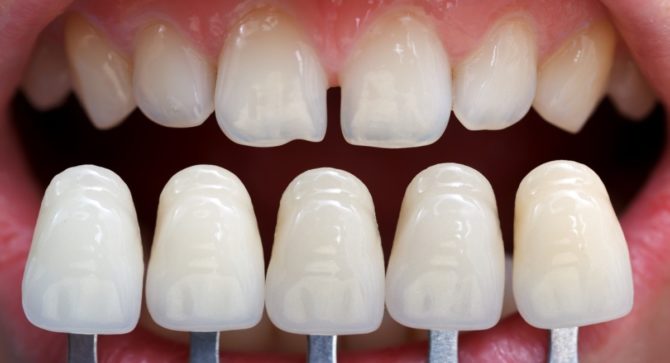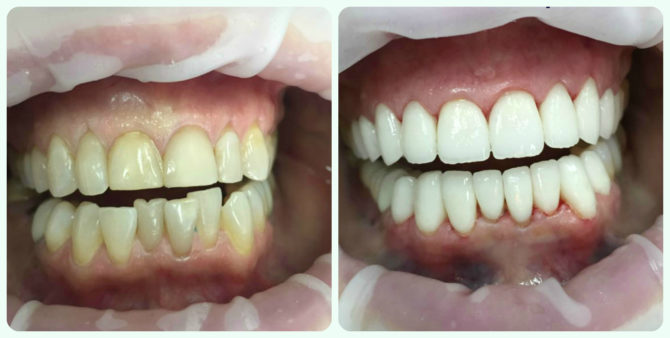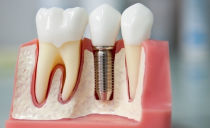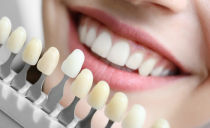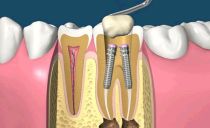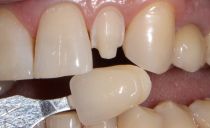How much does it cost to make and put veneers on the front teeth in dentistry
Modern dentistry has a large arsenal of tools that can restore the aesthetic appearance of teeth. Veneers also belong to such tools, their installation is one of the easiest ways to correct the imperfection of incisors, fangs and premolars. How much it will cost to put veneers on the front teeth depends on the choice of a specific material, manufacturing methodology and clinic.
Content
What are veneers
Veneers are called microprostheses that are installed on the front surface of a tooth to correct its appearance. Veneers are designed for installation on the front teeth - on the so-called smile line, which includes the upper and lower incisors, fangs and the first premolar.
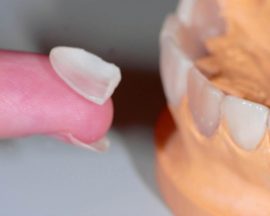 Do not consider vinyl pads a panacea that solves all dental problems - there are certain indications for installing these micro prostheses, and it is done only after thorough preparation of the oral cavity.
Do not consider vinyl pads a panacea that solves all dental problems - there are certain indications for installing these micro prostheses, and it is done only after thorough preparation of the oral cavity.
By their structure, veneers are a very thin plate made of a special material with a given color. In dentistry, a veneer can be installed on one tooth or on all front teeth.
Indications for installation
Using veneers, you can successfully solve the following problems:
- Too dark color of tooth enamel or unevenness of its shade;
- a change in the color of enamel, which can not be dealt with using whitening;
- the presence of chips on the front teeth;
- diastema (very wide distance) between the teeth;
- wedge-shaped teeth;
- uneven dentition;
- dental hypoplasia.
First-class microprostheses can fix almost any dental pathology and can serve for several decades without changing their color. However, the price of such veneers starts at 10 thousand rubles.
Contraindications to installation
It is undesirable to put veneers to people who have significant problems with teeth, when the delivered designs can significantly worsen the condition of crowns. Similar contraindications include:
- Bruxism is an uncontrolled gnashing of teeth. With this pathology, there is a high risk of damage and destruction of the veneer.
- Incomplete teething. It is recommended to refrain from installing the described structures for children with not yet fully formed teeth.
- Pathology of the bite - a direct or excessively deep bite.
- Complicated caries.
- The presence of large fillings on the tooth.
- Patient participation in traumatic sports: boxing, rugby, hockey.
It is necessary to adhere to contraindications, since it is impossible to predict whether it will be possible to make veneers on the front teeth again, and how much it will cost if they are destroyed due to non-compliance with contraindications.
Types and cost of veneers
For the manufacture of veneers, composite filling material and ceramics are used, which can be of two types - porcelain and zirconia. Let us consider in more detail each of these materials.
Composite
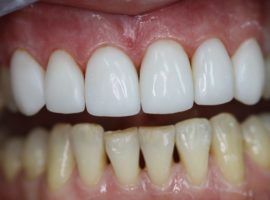 Filling composite veneers are relatively cheap. They are made in one visit to the dentist and do not require dental preparation before installation. The disadvantage is a significantly shorter life compared to ceramic microprostheses.
Filling composite veneers are relatively cheap. They are made in one visit to the dentist and do not require dental preparation before installation. The disadvantage is a significantly shorter life compared to ceramic microprostheses.
The initial cost of composite veneer linings starts from 5.5 thousand rubles. The price may rise to 9-10 thousand.R., if the doctor suggests making them not by the direct method (directly in the patient’s mouth), but using the laboratory.
Most clinics refuse composite materials for the manufacture of veneers, despite the fact that they are inexpensive, and switch to more durable and expensive. This type of micro prosthetics is chosen by those who want to supply veneers cheaply and quickly.
Ceramic veneers
In dentistry, two main types of ceramics are used: porcelain and a combined material, including a zirconia framework. They make more expensive, but better quality veneers.
Porcelain
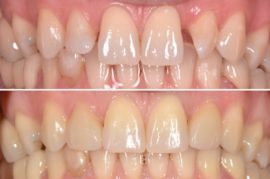 Among other materials porcelain has the most similar structure to tooth enamel. The veneers made from it make it possible to achieve high naturalness - the teeth with them almost do not differ from the “native” ones. Porcelain ceramics are used for severe tooth damage. The main disadvantages of the material: the duration of the manufacturing process, the need to grind the teeth for a more accurate fit during installation.
Among other materials porcelain has the most similar structure to tooth enamel. The veneers made from it make it possible to achieve high naturalness - the teeth with them almost do not differ from the “native” ones. Porcelain ceramics are used for severe tooth damage. The main disadvantages of the material: the duration of the manufacturing process, the need to grind the teeth for a more accurate fit during installation.
The minimum price for porcelain veneers in large cities is 15 thousand rubles. In some premium clinics, the price of veneer per tooth can reach 30 thousand rubles. This amount includes the cost of all work, including the manufacture and installation of a temporary plastic plate. You can find out how much it costs to install porcelain veneers on all front teeth by calling a specific clinic - with a large amount of work, discounts can be offered.
Zirconium
Zirconia toothpastes are high-tech products, and their manufacturing method is the most advanced.
The design is based on a zirconia dioxide framework made using virtual modeling technology. A porcelain coating is applied to this frame by spraying. Computer technology (CAD / CAM-systems) can achieve unprecedented to this degree of accuracy in the manufacture of veneer.
The disadvantages of zirconia veneers include an even higher cost compared to other varieties. This type of aesthetic microprostheses may not be made in every clinic, as special equipment and specialists with skills in working with it are required.
The choice of a specific material largely determines how much it will cost to install veneers on your front teeth. To make ceramic veneers from zirconia will not be cheap at all - in Moscow, prices for them vary from 25 to 30 thousand rubles. You can find promotional offers at which the price will be reduced by 20-25%.
The manufacturing technology of zirconia veneer linings makes it possible to achieve their very high strength, comparable to pressed ceramics. This is achieved by firing the finished product, as a result of which it acquires a monolithic structure. In some clinics, technology is disrupted, so some patients are faced with such an unpleasant phenomenon as ceramic chips.
Lumineers and ultniri
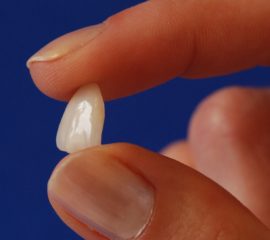 Very often in dental clinics it is proposed to install lumineers or ultranirs - a kind of veneers that differs from standard products only in thickness not exceeding 0.3 mm.
Very often in dental clinics it is proposed to install lumineers or ultranirs - a kind of veneers that differs from standard products only in thickness not exceeding 0.3 mm.
Ultrathin microprostheses are made from the same materials, but the cost of such veneers can vary by 1.5–2 times. In clinics in Moscow, you can install ultranirs worth from 30 thousand rubles. a piece.
These designs are characterized by increased fragility, but have one definite advantage - most often lumineers and ultniri do not require enamel turning in preparation for prosthetics.
Installation steps
Dental prosthetics with veneers begins with a preliminary examination and diagnosis. Caries, gingivitis and other diseases of the oral cavity, teeth require treatment - they are not installed veneers. A further prosthetics scheme is as follows:
- Coordination of material for the manufacture of linings, their color, cost.
- Sanitation of the oral cavity, including cleaning teeth from plaque and stone.
- Grinding prosthetic teeth. Turning thickness depends on the size of the veneer and can reach 0.7 mm.
- Casting, on which a gypsum impression will be made, and on it - overlays.
- For the period while the veneers will be made, the patient is set up temporary plastic plates. Usually, the lining production time does not exceed 14 days.
- Fitting and fitting the product. It should not interfere with the bite, cause discomfort during eating, talking.
- Antiseptic treatment of veneers and oral cavity before prosthetics.
- Coating the surface of the teeth with a gel to roughen them, which improves adhesion to the pads.
- Fixing the plates with cement paste, exposure to it with a light flux for hardening.
- Removal of cement residues and final bite check.
The procedure takes no more than an hour. After installing the veneers, you must adhere to the recommendations of the dentist, observe oral hygiene, and avoid strong mechanical effects on the teeth - clicking seeds, opening bottles. Since foreign material can provoke the development of the inflammatory process, patients are prescribed an additional examination, which must be attended without fail.

